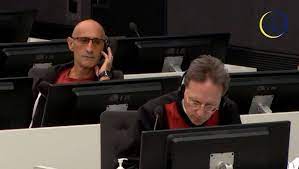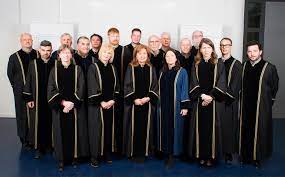On 15 September 2021, the first trial against a former member of the Kosovo Liberation Army (“KLA”) commenced before the Kosovo Specialist Chambers (“KSC”). The Indictment charges Salih Mustafa, a.k.a. Commander Cali, with four counts of war crimes allegedly committed at the Zllash/Zlaš detention facility in Kosovo during the period between 1 and 19 April 1999. The charges against Mr. Mustafa include: arbitrary detention, cruel treatment and torture of at least six Kosovo Albanian civilians, and the murder of one of them. Mustafa is alleged to be individually responsible for these crimes under various modes of liability, including: direct commission, participation in either a basic or extended joint criminal enterprise (“JCE”), ordering, instigating, aiding and abetting, and superior responsibility. On 5 October 2020, a pre-trial judge confirmed the Indictment against the accused. In response, Mr. Mustafa has entered a plea of not guilty protesting his innocence.
In his opening statement, Specialist Prosecutor Jack Smith called the case against Mr. Mustafa “a milestone” for the KSC and the development of international criminal justice in general. Smith emphasized on multiple occasions that this internationalized criminal court had been created by the people of Kosovo, who had been driving force behind the work of his Office. He stressed the importance for victims to know that their voices are heard and those persons most responsible for crimes committed during the hostilities will be held accountable. In his view, the KSC have the opportunity to demonstrate that international criminal justice can be administered in a “thorough, reasoned, transparent, efficient, and fair [manner]” and “that trials do not need to take years to complete”. The Specialist Prosecutor expressed his hope that the work of the KSC – including the case against Mr. Mustafa – would contribute to justice, the acceptance of facts and “ultimately to some healing.”
The opening of the trial against Salih Mustafa coincides with the 10-year anniversary of the start of the investigation into the alleged involvement of senior KLA officials in organ theft and other crimes against humanity in Albania. These grave accusations stemmed from a 2011 Council of Europe Report that ultimately gave rise to the creation of the KSC. Pursuant to Article 6(1) of the Law on the Specialist Chambers, the KSC’s subject matter jurisdiction shall be limited to crimes that relate to this report. However, the Specialist Prosecutor’s Office (“SPO”) has hitherto failed to explain whether the Mustafa case is sufficiently close-related to the Council of Europe to fall within the KSC’s jurisdictional scope.

In light of the fact that the criminal proceedings against Salih Mustafa were initiated after a 10-year investigation into the most heinous offences that were allegedly committed by some of the highest-ranking KLA officials, one might wonder whether this case is truly the milestone the Specialist Prosecutor presents it to be. To determine which persons bear the greatest responsibility, international justice institutions are usually guided by the level of seniority of the suspect, the gravity of the crimes committed and the scale on which these offences occurred. However, according to the Indictment Mr. Mustafa held a lower-level position of BIA-Unit Commander within the Llap Operational Zone and the alleged crimes did not occur on a massive scale.
The Specialist Prosecutor’s claims that the work of the KSC will contribute to providing justice to all victims of grave international crimes and offers Kosovo the opportunity to leave the war behind it once and for all may sound promising, but are difficult to reconcile with the selective mandate of the special court. After all, the KSC’s subject matter jurisdiction precludes the court from delivering justice equally to the victims of the Serbian regime. These victims have been hampered in their quest for justice before domestic courts, as there is no extradition treaty in force between Kosovo and Serbia. If the KSC wish to contribute to reconciliation in Kosovo, it is of the utmost importance that the Court will, at the very least, be sensitive to the suffering of those victims as well.
Finally, although the KSC were created under domestic law by the Kosovo Assembly, this was done under pressure from the United States and the European Union. For this reason, local support among the Kosovo Albanian population for this special court remains low. The fact that the KSC are located abroad will likely make it more difficult for the local population to follow the proceedings and gain a better understanding of the special court’s work. This could pose a serious problem to Specialist Prosecutor’s hopes that the work of the Court will lead to the acceptance of facts that eventually might lead to reconciliation and healing. Under these circumstances, it is all the more important that the trials before the KSC will be conducted in a truly fair and transparent manner as was advocated by the Specialist Prosecutor, while the Court must show to be cognizant of the broader historical context in which the armed conflict in Kosovo occurred. To avoid the impression of partiality, the SPO should refrain at all times from referring to places in Kosovo as being part of Serbian territory.
Renée de Geus, Editor, Maastricht Blog on Transitional Justice
